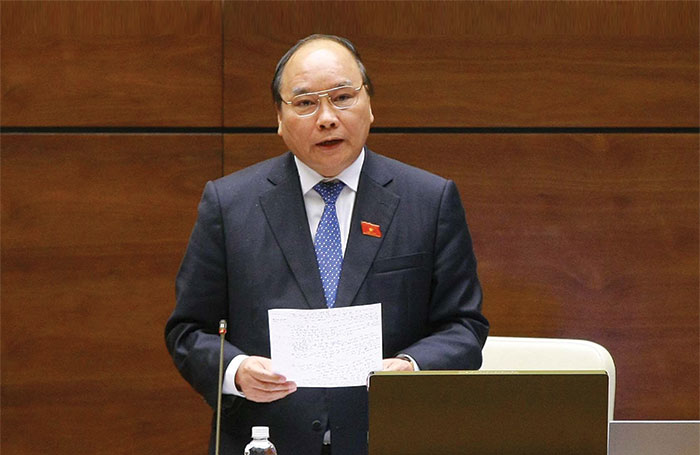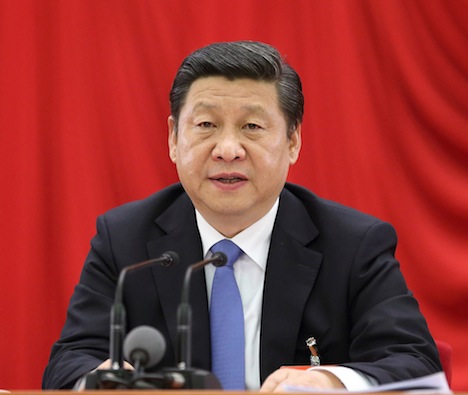
Though we normally think of the Communist-ruled Vietnam as an autocratic country, it too has politics — and it even has elections.![]()
Vietnam’s messy politics have been on a rare, full display over the course of the past month in the lead-up to this week’s 12th party congress of the Communist Party of Vietnam (Đảng Cộng sản Việt Nam). Vietnam’s ruling party will elect a central committee of between 160 and 180 members, a smaller politburo of 16 members and, from among the politburo’s ranks, the party’s general secretary, Vietnam’s president and Vietnam’s prime minister.
It’s as if the United States were selecting, in one eight-day period, the American president, vice president, executive cabinet chiefs and congressional leadership, in a secret conclave of elite gatekeepers.
* * * * *
RELATED: One reason for Americans to supprt TPP?
Absolving US sins in Vietnam.
* * * * *
But it is also a series of elections among discrete actors with divergent interests, and that’s led to some high-stakes politicking in the last month. Though just 1,510 delegates are voting in the current party congress, they represent a membership of 4.5 million Vietnamese. That’s just a fraction of the 91.7 million people that comprise Vietnam’s population, but it’s notable that the selection process has left some room for surprise.
The most audacious, perhaps, has been the tussle for power at the top, with outgoing prime minister Nguyễn Tấn Dũng gunning for the most powerful position — general secretary. The current general secretary, Nguyễn Phú Trọng, however, has been less than enthusiastic about ceding the role after just five years in the office, and international analysts had thought Dũng’s elevation as general secretary more likely than not throughout 2015.
Given that Dũng is essentially term-limited as prime minister, the only options for him seemed to be up — or out.
So after a series of internal machinations, Dũng seems now out of a job — and out of both of the central committee and the politburo after a decade serving as prime minister. An unofficial rule that Vietnam’s top party brass retire after age 65 means that both Trọng (age 71) and Dũng (age 66) were never likely to remain long at the top echelons of party leadership. But it’s a disappointment for a man that businessmen and global outsiders, in particular, had come to regard as the best of Vietnam’s ruling Communists.
In his decade as prime minister, Dũng developed a reputation as relatively reformist and pro-Western. His tenure coincided with a wave of liberalization both at home and in Vietnam’s international relations. Shortly after taking power in 2006, Dũng oversaw Vietnam’s formal accession to the World Trade Organization, and he has been a leading proponent of Vietnam’s participation in ongoing negotiations to conclude the Trans-Pacific Partnership, which could bring greater economic development and middle-class job opportunities to Vietnam, a country that still depends on much of its income from coffee (it’s the world’s largest exporter), rice and cheap manufacturing.
Though the country also resolved a long-simmering border dispute with China, Dũng has generally improved US-Vietnamese bilateral relations in a bid to contain China’s influence, and Trọng himself even traveled to Washington for the first time since the two countries ended their bloody Cold War-era conflict in the mid-1970s. US president Barack Obama is even expected to visit Hanoi in May, one of the highlights of his final year in office.
Hard-line conservatives within Vietnam’s ruling party may be thrilled to see Dũng sidelined, which clears the way for Trọng’s reelection as general secretary, though even that is not certain until the party congress ends on Thursday. It’s reasonable to expect that Trọng may not serve until the next party congress expected in 2021, when he will be 76 years old.
But Dũng’s reputation as a reformer has always been somewhat less than consistent. Reforms during Dũng’s premiership did not extend to political liberalization, and internet censorship worsened with new regulations in 2013 forbidding online discussion of political events. While Vietnam today feels less like an authoritarian police state than North Korea or even the People’s Republic of China, Dũng’s government cracked down on dissidents and democracy activists in several high-profile incidents. Moreover, Dũng has championed large, public-sector behemoths that critics have argued facilitate widespread corruption within the party system — corruption that, they allege, also extends to the prime minister’s family. Indeed, Dũng’s star dimmed somewhat in 2010 after a state shipbuilding company, Vinashin, was nearly bankrupted amid allegations of profits being skimmed for personal gain.
But for a country as opaque as Vietnam, with one of the world’s few old-school communist governments, Trọng’s apparent resilience could be a signal for the country’s future policy direction. It may mean that Vietnam’s ruling elites believe even limited reforms under Dũng were too much and too soon, though TPP accession will require Vietnam to lock in its commitment to rule-of-law reforms and the kind of deeper liberalization and privatization that it has so far shunned.
Or it may mean that the delegates didn’t want to deliver too much power to a prime minister who’s been developing a growing profile for a decade as the country’s most respected leader abroad and who could wield extraordinary power as general secretary, thereby upsetting the balance in Vietnam’s government-by-consensus model.
Or it may mean that party leaders do not want to promote someone whose relatively hawkish tone on China has pulled Vietnam closer to the United States and away from their mutual Communist allies to the north. After all, China still wields significant economic influence over Vietnam.
Or it may mean that delegates and the central committee are eager to pass the leadership (including, eventually, the top position of general secretary) to a younger generation, just as Dũng’s rise in 2006 marked a transition to a postwar generation of party officials.
Or it may mean very little at all, other than a contest of personalities. Given the decades-long push to open Vietnamese markets on ‘Chinese-style’ state capitalist lines, the most likely outcome is that neither Trọng’s reelection or Dũng’s victory means much to Vietnam’s long-term trajectory.

What we will know by the end of the week, when the party congress concludes on January 28, is the following:
- the new members of the politburo, expected to see significant turnover due to the retirement of many of the current members now over age 65;
- the new prime minister, perhaps another young reformer, though the frontrunner for now seems to be Nguyễn Xuân Phúc, age 61, a current (if low-ranking) member of the politburo, one of four deputy prime ministers and not particularly close to Dũng;
- a new president (today it’s a mostly ceremonial role) to replace the retiring Trương Tấn Sang; and
- whether Trọng will stay on as general secretary, though we will not necessarily know about any deals that could see Trọng step down between now and the expected 13th party congress.
Those appointments, which will be duly ratified by Vietnam’s National Congress later this year as a formal matter, will not necessarily tell us so much about where Vietnam may or may not be headed. But the extenuated tussle between Dũng and Trọng, far more open and public than any before it (and more public than any fight for the Chinese Communist Party’s leadership, for example) shows that there is real political competition in Vietnam, even at its top levels.

